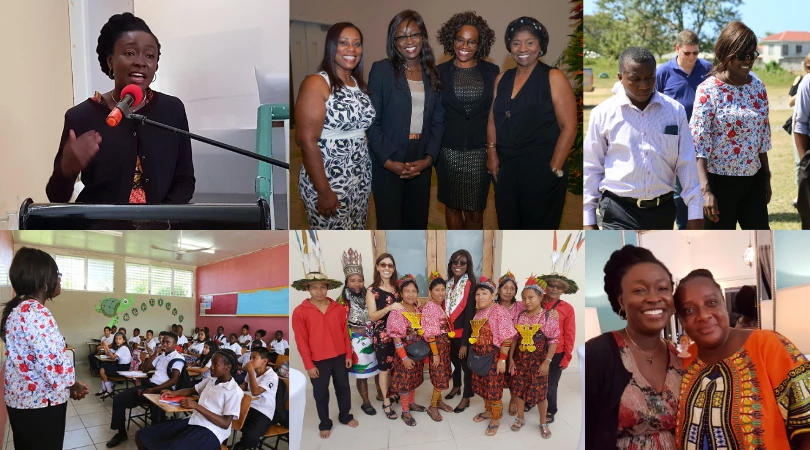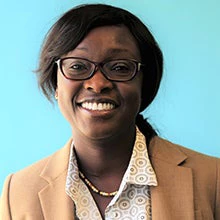 Woman in Corozal, Honduras. Photo: Jessica Belmont
Woman in Corozal, Honduras. Photo: Jessica Belmont
Only a few months ago, mentioning the words discrimination and racism was taboo in many topics of the public agenda. Today, more governments companies, non-governmental organizations, and we ourselves as international organizations and individuals, recognize that we must openly, clearly and directly address discrimination. Firm action must be taken so that minority groups are respected and incorporated into society. They deserve equal treatment regardless of their gender identity, skin color, nationality, physical or mental condition or ethnic group.
My name is Seynabou Sakho and I am African, from Senegal. As the Afro-cuban poet Nicolás Guillén would say, we descendants of Africa are a big family that “without knowing each other recognizes each other.” I come from a multicultural background and today I pay tribute to my ancestors. To my Arab grandmother and to my children, in whom I see reflected the experiences of Black minorities crying out because they can’t breathe.
Since I was little it was clear to me that diversity is one of the greatest riches of humanity. Today, I have an opportunity to rethink the future, to rebuild the world into one that is truly equal. This is an essential prerequisite to end poverty and promote shared prosperity, which are the two main objectives of the World Bank Group. Achieving them also depends on eliminating discrimination and racism.
The indignation and protests in response to the deaths of Afro-Americans at the hands of the police, the case of George Floyd being the most recent, have generated a period of introspection. It is the line that delineates a yesterday and a today, in the daunting task before us to achieve a world without discrimination, where everyone, as equals, feels free and protected in our most intimate expressions as members of society.
Currently, discrimination against the elderly, the LGBTQIA+ population, migrants and refugees, internally displaced persons, indigenous people, Afro-descentants, people with mental illness or physical disabilities, and even youth and women has become more noticeable. These people are often stigmatized in economic and socio-political contexts, which creates barriers in their education and job opportunities and limits their access to quality basic services. As a result, they are those most likely to live in poverty.
Let’s take the example of women. Our study, Women, Business and the Law 2020 shows that when women are able move more freely, work outside the home and manage assets, the economic development of their country is strengthened, contrary to when discriminatory laws prevail.
We must promote concrete actions so that we are all respected and incorporated into the social fabric, without receiving unequal treatment due to skin color, nationality, sexual orientation or gender identity, physical or mental condition or ethnic group to which we belong.
To be successful, any poverty reduction policy and strategy must be inclusive and propose egalitarian actions where no one is deprived of their well-being , having a decent home, having adequate food, receiving medical care, working under safe conditions, going to school and learning, having clean water and sanitation, access to transportation and leisure spaces.
Towards a Central America Free of Racism and Discrimination
Central America is a region marked by inequality and vulnerability, both of which increase in situations such as under the impact of climate change, forced migration and now the COVID-19 pandemic , where people who suffer from discrimination and poverty are always the most affected.
Today I invite you to join the efforts led by minority groups, civil society leaders, organizations and institutions at the local, national and regional levels to to stop discrimination and racism and rebuild based on equal opportunities for all.
At the World Bank we started a dialogue to support Afro-descendants in Central America. Since 2018, when we presented our report, Afro-descendants in Latin America: Toward a Framework of Inclusion in San José, Costa Rica, we have been dedicated to sharin the challenges and to listening and learning about the hearl of the Afro culture as a first step towards proposing solutions. We subsequently discussed this report with Afro-descendants in Honduras, El Salvador, Panama and Nicaragua during frank, safe exchanges where citizens of those countries told us about their situations. It is based on those conversations that we can continue, together with other allies like the United Nations Population Fund (UNFPA), our work in favor of an inclusive society, based on the vision and development needs of each group.
We know that Afro-descendants are 2.5 times more likely to live in chronic poverty than other Latin Americans, that the likelihood of being poor is greatest among households headed by Afro-descendant women and that regions such as the Caribbean coast have a high concentration of Afro-descendants that live with many unmet needs.
At the halfway point of the International Decade for People of African Descent (2015-2024), we should continue this dialogue with audacity, and that will only be possible with greater participation of everyone.
We now have the opportunity to change the situation, not only for Afro-descendants, but also for other groups that suffer from systemic discrimination. It is crucial to guarantee that public policies and programs, including those that promote access to quality basic services such as health and education, as well as private sector investments, reach those groups.
Together with governments, civil society, other international financial institutions, academia, businesses and opinion leaders we need to work together to move forward. We have a key role in promoting collective responsibility toward progress, in a climate where people can develop skills to get respectable jobs for equal pay.
At the World Bank, we will continue working on this agenda through research and dialogue on public policies in favor of these communities. We will ensure that our investments get to the poorest, including groups historically excluded from development.
It is time to break with the taboo of discrimination and racism once and for all, so that the opinions, identities and aspirations are equally respected and lead to the long-awaited social and economic inclusion.



Join the Conversation